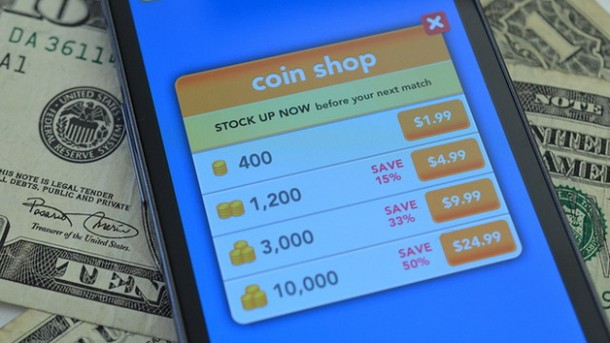Whether you’re into endless runners, dungeon crawlers or street racers on your mobile device, you’ve most certainly encountered an in-app-purchase or several by now. And for what? To just continue playing the game? Or do you need coins to buy upgrades to become a Grand Poobah with skill points maxed out and start at Level 15? No thanks, that’s not how I was raised. IAPs are becoming more commonplace these days, and that’s a cause for concern — even if you’re happy to ignore them.
To be clear, I’m referring to IAPs that directly affect gameplay, such as coins, tokens, skill points and unlockable items that players would otherwise have to earn (as opposed to additional downloadable content, like levels or novelty characters). They’re everywhere now, and you never know what you’ll have to pay for next. But to be honest, the problem isn’t really with the concept of IAPs itself — it’s about how they are implemented, what that implies for gamers and developers, and the possible repercussions for the industry at large.
Generally, most IAPs allow gamers to unlock advantageous bonuses in a game, be they levels, boosts or new skills. That immediately deals a crushing blow to any challenge that the game might offer to players. Isn’t that pretty much why people want to play games in the first place? Gamers are always looking for new obstacles to overcome, new enemies to defeat, and figuring out the best ways to do so.
Similarly, these IAPs run any real notions of competition into the ground: if one player can oust another from the top spot on the leaderboard by buying his way up there, is there any point keeping score? All you’d really be doing is spamming your friends on social networks and letting them know how dependent you are on recognition from others, for money. Competition and challenge are what gamers come back to their mobile devices for, and it’s a shame to see those key aspects of gameplay taken off the table in the name of revenue generation.
Now, I’m all for developers finding new ways to make money, but the introduction of a persistent commercial engagement system that controls the quality of the experience of a game doesn’t seem like the way forward. By supporting such IAPs as gamers, we’re saying to the world that we don’t care what we play, as long we get to be #1. When developers support such IAPs, they’re curtailing their creative freedom, and pushing their industry into a downward spiral — from creating interactive art to dishing out virtual stickers.
Think about what that spells for young developers entering the job market — a major number of opportunities will come from studios that specialize in IAP-driven games, which means these developers will end up working on projects that have no soul and offer little to no creative satisfaction. It’s not going to be fun watching the industry devolve into a machine that endlessly churns out mindless titles with the same tired themes and core loops. And in the same way, such games will change players’ expectations too: new gamers will get used to paying their way to the top, and miss out on what it means to master a game, develop a playing style and beat the competition.
I’m not trying to damn all casual game developers to hell, but I do think that there are better ways of making money off games. For instance, charge players for every round of a multiplayer game they participate in. I like to cite the example of Fun Run, a ridiculously addictive 2D platform racer (with weapons!) that supports up to four players at a time; my friends play an average of 10 rounds a day, connecting with each other via a Whatsapp group. If the developers charged 2¢ per player per multiplayer round (a very nominal rate by any standards), they stand to earn up to $6 per player each month — not bad for a free title, wouldn’t you say?
An IAP system like this will challenge developers to get more creative with IPs and game mechanics, without diluting the core experience of their products. Plus, multiplayer gaming is only going to become more ubiquitous in the future, and will provide numerous opportunities to monetize games. Major MMOs have already set the precedent for this, and the concept of paying to play with friends isn’t really anything new. It just needs to be implemented correctly in order to work, and both gamers and developers stand to gain from it.
The future of gaming should be about more immersive experiences, experiments in the art of interactive storytelling, and new ways for players to engage with each other in virtual and real worlds. I don’t believe there’s room for evil IAPs in that future, and I hope there isn’t any. Mobile gaming can be a lot more than it currently is, but only if gamers support developers who are fighting the good fight. Seriously, no one really cares if you’re a Class A Centaur with +35 damage; we know you paid for it.

















